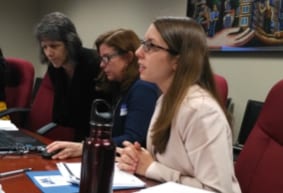
May 1, 2017
Lawyers trained to offer free help to struggling low-income students
“How can we work together to make sure a student is in an environment that allows them to learn effectively?”
The question was asked, and then answered, by CLA staff attorney Nicole Cardamone, pictured above. She was leading a training in special education law for attorneys interested in offering pro bono representation to low-income families struggling to ensure that their child’s special needs don’t present a barrier to receiving a quality education.
The training was held April 28 in Worcester at Community Legal Aid’s office. Attended by about 15 attorneys, the training was sponsored by the Medical-Legal Partnership, which is a collaboration between CLA and UMass Memorial Healthcare.
Federal and state laws require that all school districts provide eligible students from ages three through 21 with special education and related services needed for these students to progress effectively in school. This could range from special considerations in test taking to alternate forms of transportation and providing access to counselors.
Social and emotional needs are also part of these requirements. For example, a student with a severe anxiety disorder may excel at their schoolwork, but, if the bus ride to school is a trigger for panic attacks, begin to regularly miss school. If the student is evaluated by the school district and found eligible, , the school district should make provisions that allow the student to arrive at school with less difficulty, possibly through bus monitors or a smaller bus.
“Schools prepare students for adulthood,” Cardamone said. But doing so includes looking at how a student is progressing socially and emotionally in school, in addition to how he or she does in core academic subjects. A lack of social/emotional progress may be in part seen in a student’s complete lack of interaction with peers, for example.
When a student’s team, which includes the student, when appropriate, his or her parents, the school district, and experts, when appropriate, determines the student is eligible for special education provisions, this team develops a special plan to meet those needs and develop goals for the student. This plan is called an “individualized education program,” or IEP.
For those without a background in education law, navigating the system can be complex. Often, a student and his or her family will not know what their rights are or, if they do, not know how to ensure them. This is where legal advocacy is helpful.
Since attorney fees are often prohibitive to low-income families, access to a pro bono attorney could be vital. While Community Legal Aid provides free attorneys, the agency does not have enough funding to cover everyone who needs help and qualifies for it. CLA has developed a network of pro bono attorneys to refer cases to, in education as well as in other fields of law.
Often, a medical professional will be the first to notice that a child might need special education.The Medical-Legal Partnership was developed, like other medical-legal partnerships nationwide, because medical professionals, in talking with their patients, often realize that there is an underlying legal issue that needs to be resolved for a patient to fully protect their health. An example often given is of a child with lead poisoning: the doctors handle the medical aspects, but getting an uncooperative landlord to comply with anti-lead laws is an area for an attorney.
In special education, medical professionals, social workers, and other care providers make referrals when they sense that a student’s medical, social, or mental health needs require special considerations that are not being addressed. To support the work of CLA, please click here. If you’re an attorney and would like to become involved in the Medical Legal Partnership, click here.

















































